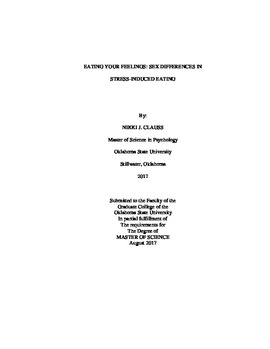| dc.contributor.advisor | Byrd-Craven, Jennifer | |
| dc.contributor.author | Clauss, Nikki J. | |
| dc.date.accessioned | 2018-06-13T16:19:49Z | |
| dc.date.available | 2018-06-13T16:19:49Z | |
| dc.date.issued | 2017-08-01 | |
| dc.identifier.uri | https://hdl.handle.net/11244/300053 | |
| dc.description.abstract | Stress-induced consumption of highly palatable food could be one potential pathway from stress to obesity. Despite a sex-independent correlation between BMI and subjective stress (Block, He, Zaslavsky, Ding, & Ayanian, 2009), it is unclear whether males engage in stress-induced eating to a similar extent as females (e.g. Grunberg & Straub, 1992; Zellner et al., 2007). The current study hypothesized that exposing male and female participants to sex-specific stressors would lead to similar levels of stress-induced consumption of highly palatable food between sexes. Using respiratory sinus arrhythmia (RSA) as a measure of stress, we effectively replicated the experimental sex-specific paradigm proposed by Stroud and colleagues (2002), in which males are theorized to demonstrate higher stress after an achievement stressor and females are expected to demonstrate higher stress after a social rejection stressor. Results demonstrated that males and females consumed a significant amount of highly palatable food after either the social rejection or the achievement condition than they did after the control condition. For female participants, food consumption was also associated with current menstrual cycle. However, self-reported pathological eating behavior did not play a significant role in the amount of highly palatable food consumed, and there were no sex differences in post-stressor taste preferences of highly palatable food (i.e. salty vs sweet). | |
| dc.format | application/pdf | |
| dc.language | en_US | |
| dc.rights | Copyright is held by the author who has granted the Oklahoma State University Library the non-exclusive right to share this material in its institutional repository. Contact Digital Library Services at lib-dls@okstate.edu or 405-744-9161 for the permission policy on the use, reproduction or distribution of this material. | |
| dc.title | Eating Your Feelings: Sex Differences in Stress-Induced Eating | |
| dc.contributor.committeeMember | Hawkins, Misty | |
| dc.contributor.committeeMember | Grant, DeMond | |
| osu.filename | Clauss_okstate_0664M_15284.pdf | |
| osu.accesstype | Open Access | |
| dc.description.department | Psychology | |
| dc.type.genre | Thesis | |
| dc.type.material | text | |
